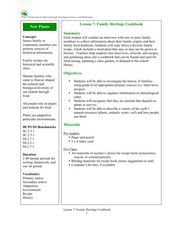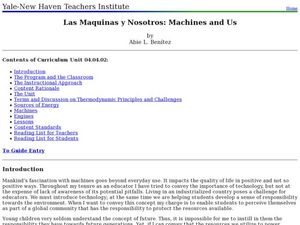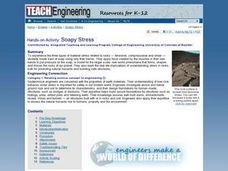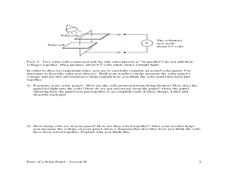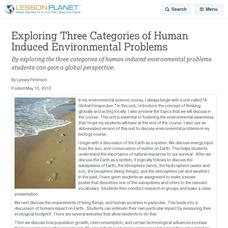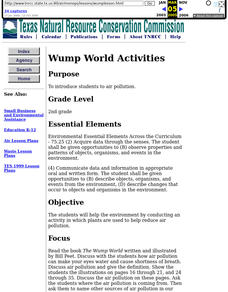Curated OER
Endangered Species !: Why Are Species Endangered?
Students explore the various issues and problems faced by endangered species globally. They research the plight of endangered species, create a poster of a selected animal, and present their poster and research to the class.
Curated OER
What Would Halloween be Like Without the Ecuadorian Rainforest?
Fourth graders are given a number of typical Halloween treats and work in groups to determine which foods came from the Rainforest (chocolate) and which foods came from temperate regions (apples, popcorn) and treats that don't have...
Curated OER
Turkeys in the Cell--The Meiosis Square Dance
Students identify synapsis as the key event in meiosis. They explain how synapsis leads to the formation of haploid gametes. Exploration of the differences between the processes of mitosis and meiosis occur. In accordance, explanations...
Alabama Learning Exchange
Muddy Water!!
Investigate water pollution. Learners start out by completing the know and want to know portions of a KWL chart on water pollution. They read a story that stimulates thinking about water pollution and view an online resource related to...
Curated OER
Family Heritage Cookbook
Students compare favorite family recipes. In this cultural diversity lesson, students interview family members and record favorite recipes. Students examine cultural diversity through favorite foods.
Curated OER
Rain Forest Research
Second graders explore the Rain Forest. In this research lesson, 2nd graders go online to gather information about Rain Forest animals. Students print and use the information to write about the many parts of the Rain Forest. Students are...
Curated OER
Awesome Adaptations!
Second graders explore biology by researching animal characteristics. In this adaptation instructional activity, 2nd graders identify the history of several animals and research the changes that have occurred to their anatomy over...
Curated OER
Las Maquinas y Nosotros: Machines and Us
Second graders explain the relationship between energy and work. In this technology lesson, 2nd graders describe the different uses of machines in their everyday lives. They record observations and data in their science journal.
Curated OER
Soapy Stress
Students investigate the three types of material stress related to rocks. They identify the three types of stress, conduct a simulation by breaking bars of soap using only their hands, and complete a worksheet.
Curated OER
Fueling Around with Energy: A Comparative Study of Conventional and Renewable Energy Use Among Nations
Ninth graders examine the relationship between energy and society. In groups, they define energy sources as renewable or conventional and research how each method contributes to the world's energy. They write about how the patterns of...
Curated OER
Parts of a Solar Panel-Part II
Learners discover how a mini-solar panel is constructed by behaving like detectives. Students examine an actual solar panel, measure the solar panel's voltage and use drawings to describe what they observe before completing questions...
Curated OER
Natural Disasters: An Adventure in Non-Fiction
Students study different natural disasters. In this natural disaster lesson students read a nonfiction book followed by a discussion, an experiment, then collect illustrations from their experience.
Curated OER
Exploring Three Categories of Human Induced Environmental Problems
By exploring the three categories of human-induced environmental problems students can gain a global perspective.
Curated OER
The Dirt on Worms!
Fourth graders make predictions, observe, collect and record data. They investigate several soil and worm websites. Finally, 4th graders write a letter to The President which defends earthworms by explaining their value to the United...
Curated OER
Robotics
students identify and research robots in various roles in society, and create robotic arms and multimedia presentation based on their findings.
Curated OER
Predator Protector Game
Students take on the role of an Ocean Adventures expedition volunteer member and are charged with protecting three species of sharks from danger in order to defend the balance of nature in the ecosystem. They play an online game which...
Curated OER
The Gray Whale Obstacle Course Viewing Guide
Young scholars complete a worksheet while watching a film about whales. They examine the human impact on whale migration and identify adaptations the whale has acquired in able to survive. They discover how global warming has effected...
Curated OER
The Population Explosion: Causes and Consequences
Students use this lesson to focus on population growth and the threat of overpopulation. In groups, they analyze the world birth and death rates to determine the growth rate of the population. As a class, they discuss the causes and...
Curated OER
Living in Kansas Today
Students compare and contrast urban and rural communities. In this geography skills lesson, students discover the attributes of the settings and respond to questions about cities and farms.
Curated OER
Cyberbullying:What is It? What Can We Do About It?
High schoolers examine the prevalence of cyberbullying. In this character education lesson, students read articles about cyberbullying and its implications. High schoolers respond to discussion questions.
Curated OER
Sixth Grade Reading Quiz
In this reading worksheet, 6th graders answer multiple choice questions about passages they read, word parts, and more. Students complete 9 problems.
Curated OER
Cloudy With A Chance of Meatballs
Third graders use a variety of information resources to identify local environmental issues and examine the ways that people have tried to solve these problems. They read "Cloudy With A Chance of Meatballs" and create a list of three...
Curated OER
Wump World
Second graders read ead the book The Wump World written and illustrated by Bill Peet. Discuss with the students how air pollution can make your eyes water and cause shortness of breath. Students discuss air pollution and give the...
Curated OER
WHAT DARWIN NEVER SAW: Evolution, Science, Biology, Natural Selection
Students view video showing recent field work on a twenty two-year study of finch beaks on a small island in the Galapagos, showing natural selection clearly operating in the wild.






